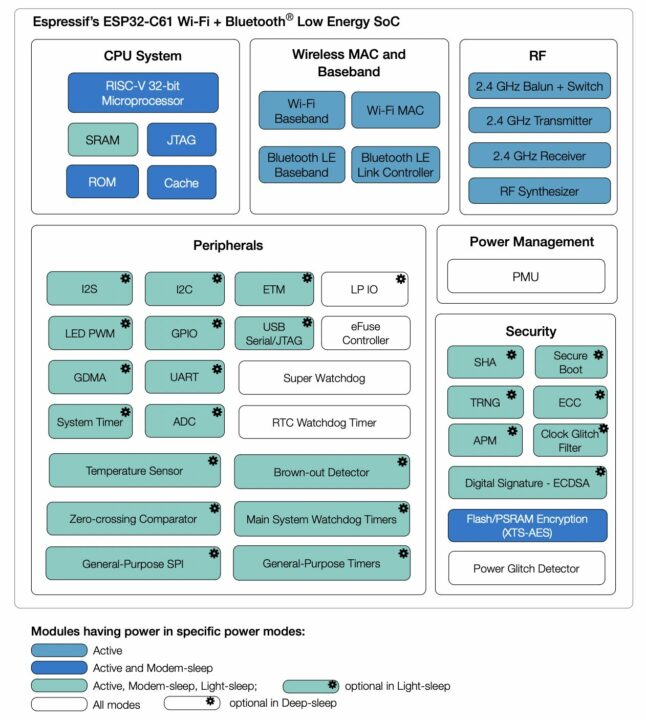Espressif has announced the ESP32-C61 SoC, a new ESP32-Cx chip with improved wireless connectivity, and expanded memory options.
The ESP32-C61 builds upon the foundation laid by previous ESP32-Cx chips, such as the ESP32-C2 and ESP-C3, and its specifications appear to be quite similar to the ESP32-C6 launched in early 2023, but this SoC also adds support for the BLE Mesh 1.1 protocol and Quad SPI PSRAM at a frequency of up to 120MHz.
It supports WiFi 6 on two modes (802.11ax and 802.11b/g/n) and includes a Bluetooth 5 (LE) radio with support for long-range operation through advertisement extension and coded PHY. The TWT (Target Wake Time) feature is supported in 802.11ax mode to save power, as well as OFDMA (Uplink/Downlink) and MU-MIMO (Downlink) for a high-quality, low-latency connection between devices.
ESP32-C61 specifications:
- CPU – Single-core, 32-bit RISC-V microcontroller that can be clocked up to 160MHz
- Memory:
- 320KB on-chip SRAM
- 256KB ROM
- Quad SPI flash
- Quad SPI PSRAM at up to 120MHz
- Connectivity:
- Wi-Fi 6, 802.11ax mode (20MHz), 802.11b/g/n mode (20/40MHz)
- Bluetooth 5 (LE)
- BLE Mesh 1.1
- Security:
- Secure Boot, Flash/PSRAM Encryption (XTS-AES), and cryptographic hardware acceleration (SHA, ECC, TRNG)
- ECDSA-based Digital Signature (DS) peripheral (introduced in ESP32-S2)
- Trusted Execution Environment (TEE)
- Peripherals:
- I2C, I2S, SPI, UART, LED-PWM, ADC, Timers, and DMA
- Event Task Matrix (ETM) module for automation-triggered tasks
- Zero-crossing comparator for detecting zero-crossing
Espressif‘s well-established IoT Development Framework (IDF) will provide support for the ESP32-C61. According to Espressif, including pseudo-static RAM (PSRAM) in the SoC will improve the number of supported applications and the ease of development for the ESP32-C61. Also, it includes support for Matter, the open-source, connectivity protocol for smart home and IoT applications. Matter allows for interoperability and compatibility between devices from different manufacturers.
The Espressif announcement didn’t include when the ESP32-C61 will be available or how much it will cost. You can find more information in Espressif’s press release.

Tomisin is a writer specializing in hardware product reviews, comparisons, and explainers. He is very passionate about small form factor and single-board computers.
Support CNX Software! Donate via cryptocurrencies, become a Patron on Patreon, or purchase goods on Amazon or Aliexpress





